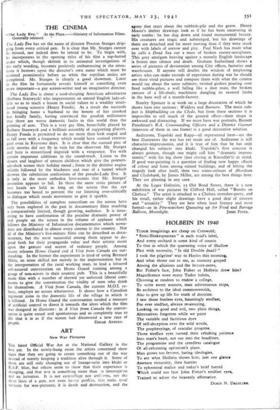THE CINEMA
“The Lady Eve." At the Plaza.--Ministry of Information Films.
Generally released. •
The Lady Eve has set the name of director Preston Sturges drip- ping from every critical pen. It is clear that Mr. Sturges cannot be missed, nor indeed does he intend to be. To begin with, he incorporates in the opening titles of his film a top-hatted snake which, though skittish in its animated investigations of the early wording, becomes positively embarrassing in the atten- tions it bestows upon the director's own name which must be retained prominently before us while the reptilian antics are completed. Mr. Sturges is clearly a good showman. Later in the film he fortunately reveals himself as something even more important—a gay screen-writer and an imaginative director.
The Lady Eve is about a card-sharping American adventuress (Barbara Stanwyck) who impersonates an amoral English lady-of- tide so as to teach a lesson in social values to a wealthy strait- laced young scientist (Henry Fonda). As a result she succeeds in bringing home a husband to the bosom of her crooked but kindly family, having convinced the prudish millionaire that there are worse domestic faults in this world than the palming of aces. This is a very gay film, beautifully played by Barbara Stanwyck and a brilliant assembly of supporting players. Henry Fonda is permitted to do no more than look stupid and to fall over with a frequency which would have seemed extrava- gant even in Keystone days. It is clear that the custard pies of early movies did not fly in vain for the observant Mr. Sturges and here is streamlined slapstick with a vengeance. Yet with certain important additions in the sound-track. Listen to the shouts and laughter of unseen children which give the promen- ade-deck scenes their holiday mood ; listen to the derisive engine whistle followed by the blackness and roar of a tunnel which drowns the rabelaisian confessions of the pseudo-Lady Eva. It is only in the more orthodox love-scenes that Mr. Sturges' invention appears to fail. In these the same static picture of two heads are held so long on the screen that the eye becomes too bored to prevent the ear listening over-critically to dialogue which needs movement to give it sparkle.
The possibilities of complete naturalism on the screen have only been explored in the past in documentary films reaching a comparatively limited, though growing, audience. It is inter- esting to have confirmation of the peculiar dramatic power of real people on the screen in the volume of applause which follows the Ministry of Information documentaries which nowa- days are distributed to almost every cinema in the country. Not all of the Ministry's five-minute films can be described as docu- mentary, but the most successful among them appear to de- pend both for their propaganda value and their artistic merit upon the gesture and accent of ordinary people. Among recent releases Home Guard and A Visit from Canada are out- standing. In the former the experiment is tried of using Bernard Miles, an actor skilled not merely in the impersonation but in the interpretation of the rural working man, to lead a leisured self-assured conversation on Home Guard training among a group of non-actors in their country pub. This is a beautifully made film with a number of shrewd yet unforced liberal com- ments to give the conversation the vitality of men who think for themselves. A Visit from Canada, the current M.O.I. re- lease, employs no actors whatsoever. It shows how a Canadian regiment joins in the domestic life of the village in which it is billeted. In Home Guard the conversation needed a measure of at tificial control to direct it towards the ideas which the film was designed to illustrate : in A Visit from Canada the conver- sation is quite casual and spontaneous and so completely true to life that it is as if the screen had discovered a new race of






























 Previous page
Previous page